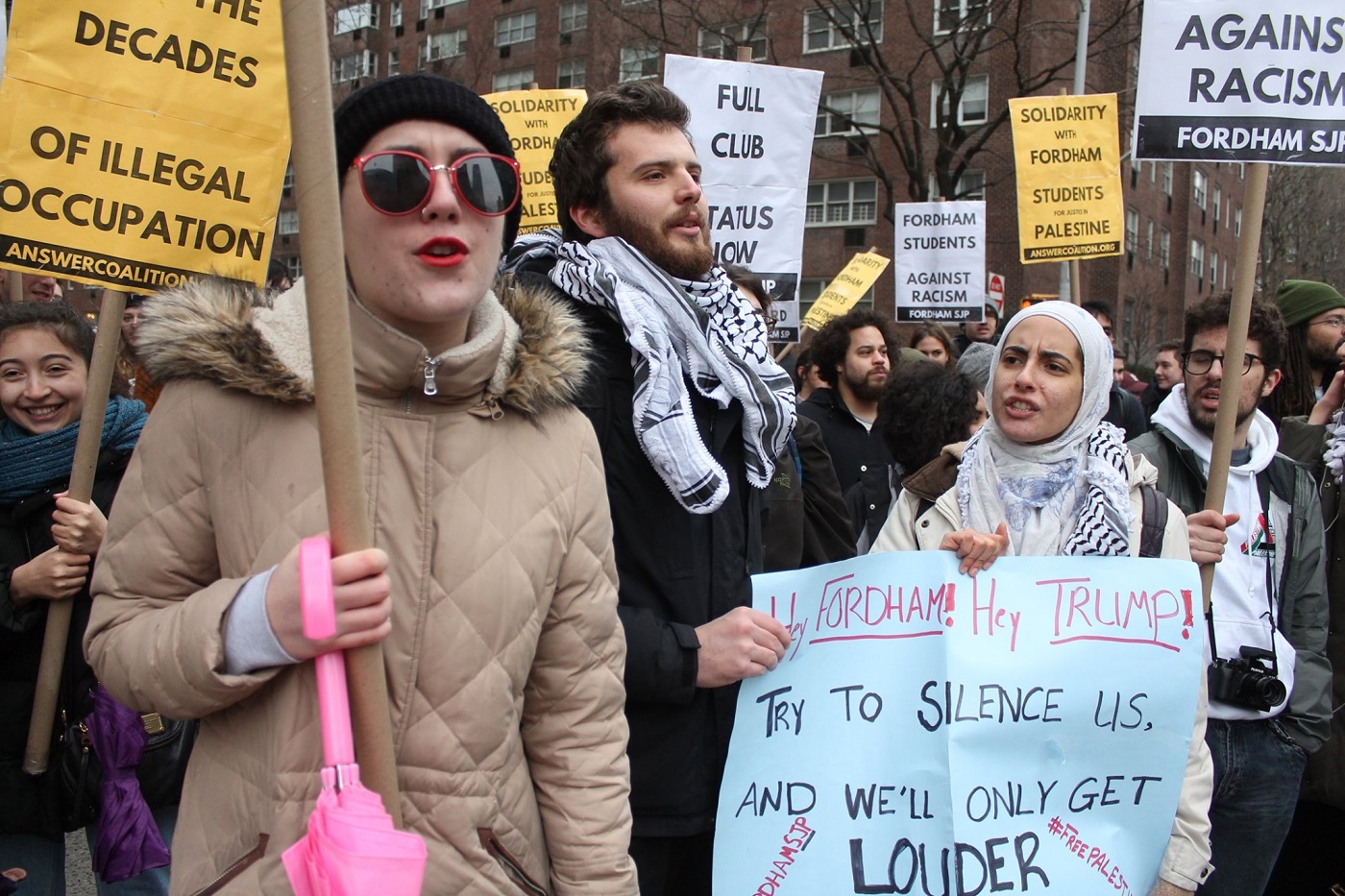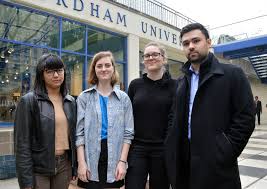
Editor’s note: The author is one of the five students who brought this suit against Fordham University.
On Aug. 5, Justice Nancy Bannon of the Supreme Court of the State of New York annulled Fordham University’s decision to ban Students for Justice in Palestine from its campus. This is the first lawsuit in the country challenging institutional censorship of students advocating for justice in Palestine. The win is the first major legal victory for free speech for advocates of Palestine on college campuses. It comes after nearly four years of student efforts to establish a chapter of SJP at Fordham.
The judge ruled that Fordham violated its own rules when it vetoed the United Student Government’s approval of SJP as a campus club in 2016. She found Fordham’s decision “arbitrary and capricious,” and violating the school’s own policies guaranteeing free expression. Nothing in Fordham’s rules permitted it, she said, to “reject an application of a student club because it criticized the policies of only one nation.” Fordham’s “disapproval of SJP was made in large part because the subject of SJP’s criticism is the State of Israel, rather than some other nation, in spite of the fact that SJP advocates only legal, nonviolent tactics aimed at changing Israel’s policies.”
The suit, Awad, et al. v. Fordham University, was brought by five university students, represented by Center for Constitutional Rights and Palestine Legal. The students are Ahmad Awad, Sofia Dadap, Julie Norris, Veer Shetty, and myself. Dadap, Norris and I are also members of the Party for Socialism and Liberation.
Rather than allow Fordham’s administration to impose its backwards and imperialist politics on us, we were victorious in the fight for students’ rights to organize for justice for Palestine. This victory shows that when we fight back, we can win!
SJP opposed from the beginning
Fordham administrators and their representatives tried to stall and subvert our efforts from the beginning.
In November 2015, prospective SJP members applied to Fordham’s United Student Government to form the club. Club officers were stalled for a year. In that time, student government representatives told Ahmad Awad, the would-be club president and lead petitioner in the suit, to revise the club’s constitution. They were instructed by the administration to solicit opinions on the SJP club from Zionist professors and the Zionist Jewish Students Organization. Student government representatives then asked us whether Fordham SJP would be following political directives from National SJP, and met with prospective club members to persuade these students to distance themselves from the National SJP and other SJPs and to choose another name for the club.
Finally, the student government voted to approve Fordham SJP as a club in November 2016, one year after the original club application. This vote in favor of the club was only possible through the persistence and organization of the involved students
According to Fordham regulations, student government’s approval is all that is needed to form a club. But even this was not enough to secure SJP’s status. Suddenly Dean of Students Keith Eldredge claimed he would “need to review the request” before SJP would officially become a club, and that he had the power to veto the club.
Dean of students bans the club, harasses members

Eldredge met with me and another student to question us about our personal politics and why we might employ BDS as a tactic. We pointed to exclusionary Israeli laws and acts of genocide committed against Palestinians by the Israeli government and explained the historical significance of boycotting occupying governments for injustices committed against indigenous people to show why we were committed to Palestinian liberation and the use of BDS as one tactic. He then banned the club.
In January 2017, SJP members held a demonstration protesting Eldredge’s decision. We were joined by supporters in the faculty and the student body who gathered on campus to call for a reversal of the decision. Eldredge retaliated by attempting to sanction two SJP members, both 20-year-old women. In a bizarre move, he summoned them to his closed office, denying their request that they be allowed to bring their lawyer or a faculty member with them to the meeting. He even set up a sound-blocking machine so no one nearby could hear the meeting!
Students demonstrated in support of the sanctioned SJP members, and over 100 faculty signed a petition asking Eldredge not to punish the two students. Because of the widespread support for SJP and the student mobilization in defense of SJP members, Eldredge could issue no more than a slap on the wrist of the two women in the form of an “official warning.”
Reflects growing struggle for Palestine
Still, Fordham’s administration had a collective arrogance that allowed them to believe they could ignore the necessity of granting SJP club status. So we filed our suit against them in April, 2017.
At the first court date, in January 2018, the courtroom overflowed with SJP supporters. When Alan Levine of CCR spoke of the long history of boycotts, Justice Bannon referenced its use as part of the Irish liberation struggle.
A year later, with three petitioners graduated and Norris halfway through her senior year, we moved, over Fordham’s objection, to add another student petitioner, Veer Shetty, who was a sophomore.
Finally, on Aug 5, Justice Bannon ruled in favor of SJP and student activists at Fordham. Not one of Fordham’s arguments against student rights held up in court.
This win reflects the rising tide of pro-Palestinian sentiment made possible by the tireless organizing of those in the Palestinian solidarity movement in the U.S. and around the world.
We forged community to win
The struggle at Fordham is not just for Palestine. For years, Fordham students have been organizing for reproductive, racial and economic justice on campus. Only through forging community and embracing the connections between different struggles on and off campus were students able to successfully campaign for a chapter of SJP. Because of this, Fordham SJP draws its support from the Fordham community and the Palestine solidarity movement.
Ahmad Awad, lead petitioner, said of the victory: “Although over a thousand days have passed since we initiated the process for club status, I have not given up on my just fight for human rights and free speech. I have continued to advocate for justice in Palestine, and now by order of Judge Nancy M. Bannon, no longer will another Fordham student be restricted or prohibited from advocating for justice in Palestine.”
Organizing on campus is an important step — now it is up to students at Fordham, and for all of us, to continue fighting for Palestinian liberation. Together we can win. Free Palestine!





